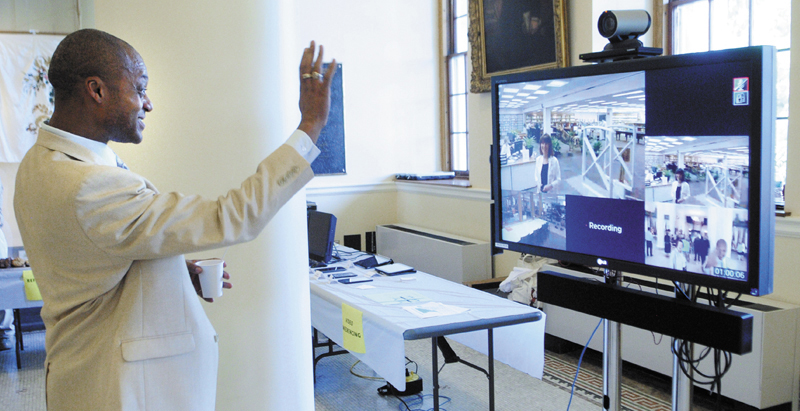AUGUSTA — Expansion of broadband technology to more than 100 libraries across the state was hailed Friday for its potential to spark economic recovery by providing the unemployed the tools they need to land a job.
The Maine State Library’s recently completed $1.9 million Broadband Technology Opportunity Program aims to provide high-speed Internet access to residents who now lack the service and as a result are disadvantaged in their search for a job.
“No matter where you live in Maine, you can get access to high-speed Internet and get help finding a job,” Maine State Librarian Linda Lord said. “With librarians across the state, we are working hard to ensure Mainers know their local public library is a place where they can find a book, a video, and also get free access to high-speed Internet and good, practical help finding a job.”
Lord spoke to dozens of librarians and state officials who gathered Friday in the Hall of Flags at the State House to celebrate completion of the two-plus-year project.
The project resulted in a 40 percent increase in publicly available computer work stations at 107 libraries around the state, Lord said. A $1.6 million grant through the U.S. Department of Commerce, matched with $600,000 from the state, also paid for a new video conferring system that now links 14 public libraries across the state, including in Farmington, Skowhegan and the Maine State Library in Augusta.
Nationally, about 40 percent of library visits are work-related, according a 2013 report released by the American Library Association.
In Maine, about 200 local libraries have developed and carried out about 25,000 hours of job training over the past two years, Lord said.
Patrick Therrien, a 20-year Navy veteran with a master’s degree in organizational leadership and a graduate certificate in human resources management, was unemployed for two years when he was chosen to use his experience searching for a job to develop the employment-related courses under the broadband initiative.
“It’s not just job-seeking anymore; it’s employment warfare,” Therrien said. “If you want to land that dream job, you have to one-up the competition.”
To do that, job-seekers must have the right tools and know how to use them, Therrien said, pointing to computer skills, résumés, cover letters, interviewing skills, and using social media for job searching and networking.
Therrien said the grant helped buy software to stream training sessions that can be watched anytime from anywhere with computer access, including a home computer. Therrien and others conducted more than 120 training sessions, including special training for military veterans, at libraries from York to Presque Isle.
“I can tell you that there are experiences you have in serving your country that are incredibly valuable to employers today,” Therrien said. “But many veterans I encountered didn’t know the right civilian language to use or how to talk about their background and experiences in a way that employers would understand and recognize as being important assets.”
U.S. Rep. Mike Michaud, D-2nd District, the ranking member of the Committee on Veterans Affairs, said at Friday’s event that training was vital to helping veterans transition back into civilian life.
“This digital infrastructure is important for economic growth,” Michaud said.
Peter Pare, executive director of the Maine Department of Labor’s Bureau of Employment Services, said there are 48,000 unemployed Mainers and only 12 career centers.
“For many … in rural areas, simply getting to a career center can be a challenge,” Pare said. “Through our partnership with the Maine State Library, we have a tremendous set of tools available online and over 200 public libraries where Mainers can access those tools.”
The broadband program will not focus just on reducing unemployment, officials said. The videoconferencing equipment will allow greater access to legal services and health care and even afford opportunities to visit places of interest out of state.
Rep. Craig Hickman, D-Winthrop, attended Friday’s event in the Hall of Flags, and he waved at a videoconferencing monitor to Maine State Library employee Jill Sampson, who was at the library, watching the State House event.
Librarian Cara Sawyer, of Cherryfield, in Washington County, said some of her visitors have used the videoconferencing equipment to take virtual guided tours at the Smithsonian Museum in Washington, D.C.
“It’s something that even if you go to D.C., you probably wouldn’t have the opportunity to do it,” Sawyer said. “It’s as if you’re in the room.”
Janet McKenney, the Maine State Library’s director of library development, said the broadband program has provided the infrastructure, but more work is need to teach Mainers how to use it. National and state programs, including one McKenney called a “technology petting zoo,” will be launched soon to help fill the gap.
“We still have significant challenges,” she said. “Digital literacy is a key skill for today’s workforce.”
Craig Crosby — 621-5642
ccrosby@centralmaine.com
Send questions/comments to the editors.



Success. Please wait for the page to reload. If the page does not reload within 5 seconds, please refresh the page.
Enter your email and password to access comments.
Hi, to comment on stories you must . This profile is in addition to your subscription and website login.
Already have a commenting profile? .
Invalid username/password.
Please check your email to confirm and complete your registration.
Only subscribers are eligible to post comments. Please subscribe or login first for digital access. Here’s why.
Use the form below to reset your password. When you've submitted your account email, we will send an email with a reset code.